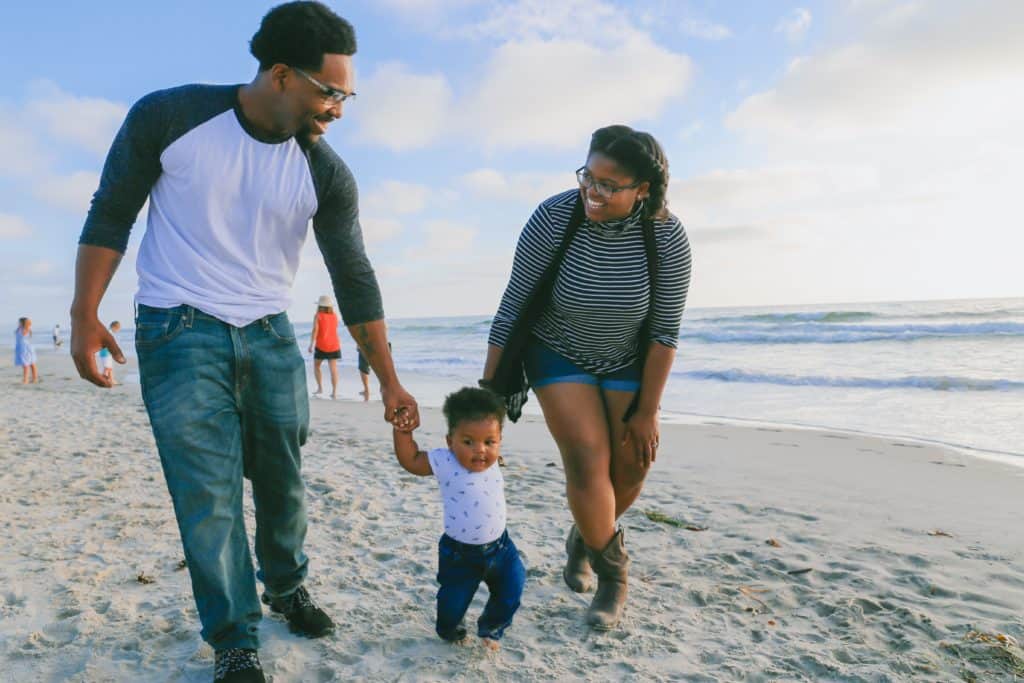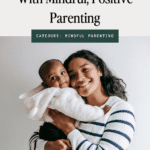
Mindful parenting is a newer way of parenting that is becoming more and more popular. It is based on mindfulness, which is a type of meditation.
Before you click away because you believe that mindfulness is maybe a woo-woo thing, consider this: mindful parenting has been shown, through research, to help with everything from reducing stress and anxiety in parents to improving relationships between parents and children.
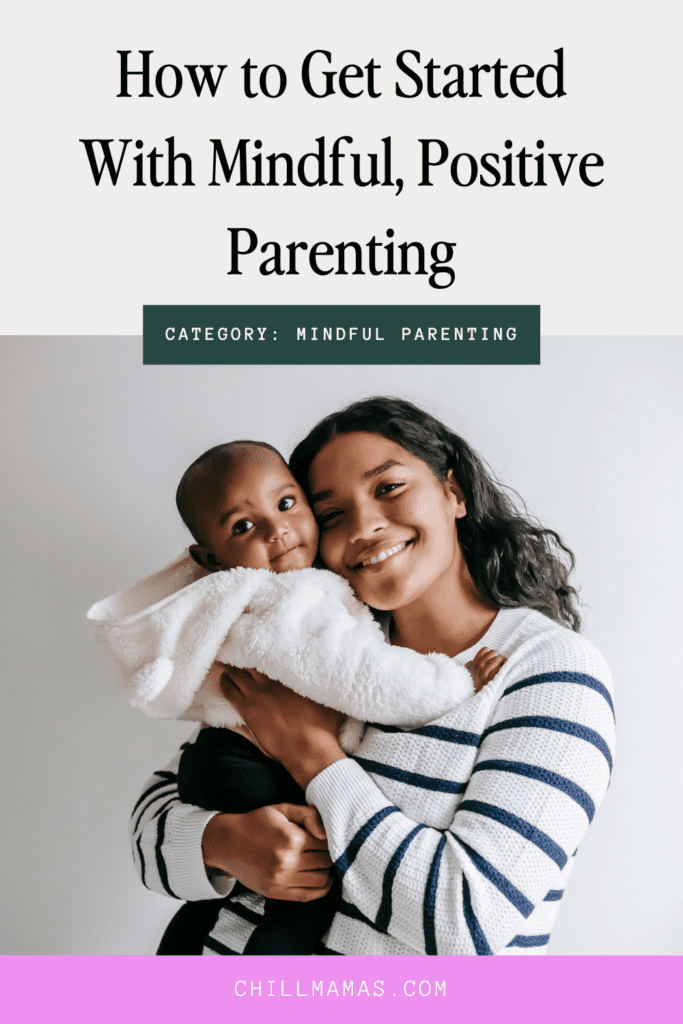 Pin
PinMindfulness can be used to focus on the present moment, and this can help you to be more aware of your thoughts and feelings, as well as the thoughts and feelings of your child. This can help you to respond to your child in a more mindful way, rather than reacting in a way that is based on your own emotions.
This is absolutely HUGE because when you stop reacting to situations based on your own emotions (which can involve trauma responses from unresolved childhood trauma) then you can address parenting situations in a logical, level-headed way.
Babies and little kids are going to be annoying and frustrating sometimes. It’s just a fact of life.
We, as adults and caretakers, need to be able to react to our children calmly and logically. If we are getting triggered because of a trauma response to loud noise or back-talking, we are less able to parent our children effectively.
Affiliate Disclosure: Some of the links in this post are affiliate links. This means that if you click on the link and purchase an item, I will receive a commission at no extra cost to you. I only recommend stuff I love and would recommend to a friend.
What are the benefits of mindful parenting?
There are many benefits to mindful parenting, including:
- Improved communication with your child
- A greater understanding of your child’s needs
- Better self-awareness
- Enhanced patience
- Decreased stress
- Improved relationships with your child
How to be a mindful parent
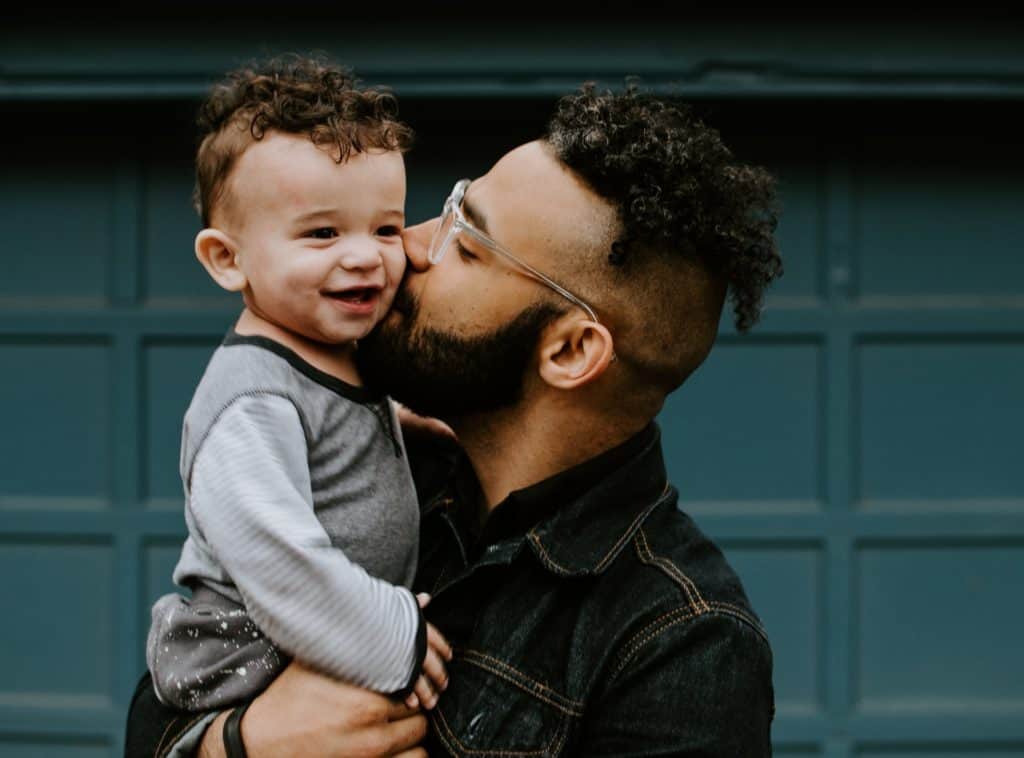 Pin
PinIf you are new to mindful parenting, there are a few things that you can do to get started. Becoming more mindful isn’t a single class that you can take or an article you can read.
It’s more of an intentional effort to stay in the moment with your kids when possible and to avoid getting triggered and invoking your trauma responses, which may include yelling/screaming, hitting/spanking, or saying hurtful things that you later regret.
Even if you’ve engaged in those behaviors in the past, it’s important to know that you do have the power to change your behavior and that many parents struggle with the same internal issues. You’re not a bad person for having trauma responses, but you can definitely address them for the benefit of your child and your relationship with them.
Mindful parenting for beginners: How to get started
To start with mindful parenting, you’ll want to learn how to do these two things:
- Practice mindfulness
- Recognize when you’re becoming triggered by your kids and learn how to address that without resorting to trauma responses and other harmful behaviors
Starting to practice mindfulness
First, it is important to find a quiet place where you can sit or lie down comfortably. You may want to close your eyes and focus on your breath.
Once you are settled, begin to pay attention to the sounds around you. Notice the way that your body feels and the thoughts that are passing through your mind. If your mind wanders, simply bring your attention back to your breath.
You can also try mindful walking, which is a great way to practice mindful parenting if you have young children. To do this, simply focus on your breath and the sensations in your body as you walk.
Pay attention to the way your feet feel as they hit the ground and the way your arms swing as you walk. You may also want to notice the sounds around you and the way the air feels on your skin.
Apply mindfulness to parenting
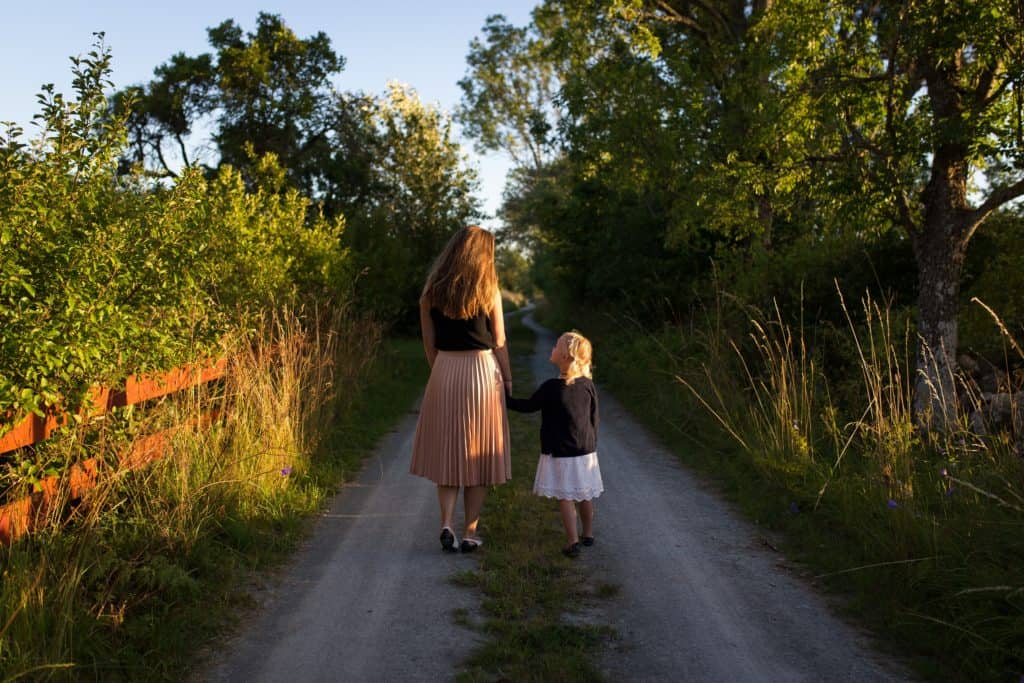 Pin
PinYou’ll want to be mindful of your child’s needs and wants. Pay attention to their body language and the way they are behaving.
Try to understand what they are trying to communicate to you. This can be difficult at first, but with practice, it will become easier.
You may also want to practice mindful listening, which is a great way to improve communication with your child. When your child is speaking, try to focus on their words and the meaning behind them.
Don’t get caught up in trying to think of a response or fixing the problem. Just listen and try to understand what they are saying.
The next step is to check out some age-appropriate mindful parenting techniques for your kids and to get deeper into the topic by reading or listening to books and podcasts, watching videos, and discussing mindful parenting with other parents.
Mindful parenting tips for toddlers and preschoolers
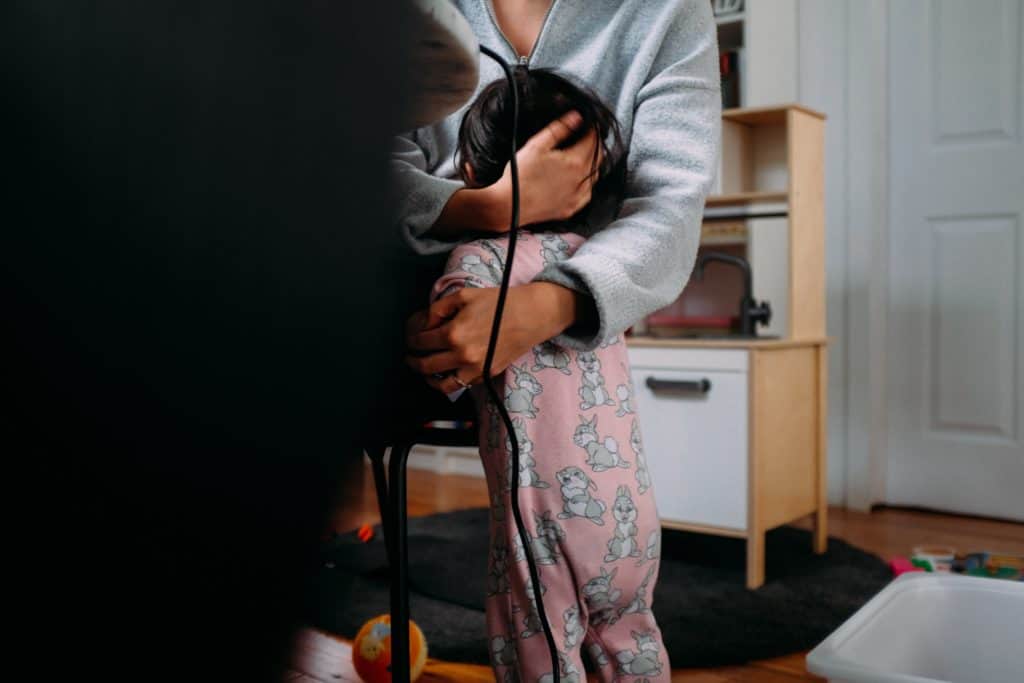 Pin
PinMindful parenting is a term that is becoming more and more popular, but what does it actually mean? Mindful parenting is simply the act of being present and aware of your child in the moment, without judgment.
It sounds easy enough, but in the hustle and bustle of everyday life, it can be difficult to slow down and really be present with our little ones. Here are a few tips to help you get started with mindful parenting for toddlers:
Spend some time each day engaging in activities that you enjoy together without any distractions. This could be reading a book, playing a game, or even just talking and cuddling. The important thing is that you are both fully present and focused on each other.
When you are interacting with your child, try to avoid multitasking. That means no checking your phone, no watching TV, and no doing anything else that takes away from your full attention on your toddler.
Be aware of your own emotions and how they might be affecting your interactions with your child. If you are feeling stressed or overwhelmed, take a few deep breaths and focus on being calm before you engage with your toddler.
Take some time each day to just sit and observe your child. This can help you to better understand their actions and behaviors. Try not to judge or label their behavior, but simply observe and accept it.
When your child is acting out, try to see it as an opportunity to teach them about mindful emotions and how to deal with them. For example, if your child is having a tantrum, you can help them to understand and label their feelings, and then teach them some mindful breathing exercises to calm down.
Avoid a reward and punishment approach to behaviors from your child. Licensed family therapist and mindful parenting coach, Noelle Wittliff says, “A child may manage his behavior to avoid being punished or to elicit praise from his parents. The risk though is that children who grow up with this model are often on guard. Their behavior and internal sense of self develops in response to threat and reward rather than developing in a climate of support and emotional safety.”
When you are reading stories together, ask your child questions about the characters’ emotions and what they might be thinking or feeling. This will help your child to become more mindful of the emotions of others.
During conversations, really listen to what your child is saying and try to understand their perspective. This will help you to better connect with them and build a stronger relationship.
Help your child to label their emotions by teaching them the names of different feelings. You can also teach them some mindful breathing exercises to help them deal with big emotions.
Encourage your child to use their imagination and play make-believe games. This will help them to be more creative and mindful of the world around them.
Mindful parenting tips for teenagers
Mindful parenting is a type of parenting that is based on being aware of and present in the moment with your child.
It is about really listening to what your child is saying and not just reacting to their words or behaviors. It is about being mindful of your own emotions and limits as a parent so that you can be more responsive rather than reactive with your teenager.
Here are some mindful parenting tips for parents of teenagers:
Take a step back and take a deep breath before you react to what your teen has done or said. This will help you to avoid reacting out of anger or frustration.
Ask yourself what your teen is really trying to say or communicate with their behavior. Often, there is something underlying their actions that they are struggling to express in words.
Listen to your teen without judgment, criticism, or advice. Just allow them the space to be heard and seen. Mindful parenting for teens means providing them with the space to be heard and seen. It means listening to them without judgment, criticism, or advice. Just allowing them the space to be themselves.
This can be a challenge for parents, but it is so important for teen development. When teens feel seen and heard, they are more likely to trust their parents and feel supported in their decisions. In turn, this can lead to healthier relationships and a stronger sense of self-identity.
When you do respond to your teen, do so with unconditional love, empathy, and understanding. This can be hard when our teens are pushing our buttons, but it is important to remember that they are just trying to figure out who they are and what they believe in – just like we did at their age
The best mindful parenting books
 Pin
PinIf you’re looking for some guidance or a clear roadmap on how to get started, check out some of these best mindful parenting books.
In “Peaceful Parent, Happy Kids,” Dr. Laura Markham provides parents with a simple yet effective blueprint for raising calm, confident, and cooperative children. Throughout the book, she emphasizes the importance of nurturing your own emotional well-being as a foundation for good parenting. This book is perfect for parents who are looking for ways to reduce stress and cultivate more peace in their homes.
If you’re interested in exploring the intersection of parenting and spirituality, “The Conscious Parent” by Dr. Shefali Tsabary is a must-read. In this book, Dr. Tsabary explores the mindful approach to parenting and offers readers insights into the inner lives of children. This book is perfect for parents who are looking to deepen their understanding of their children and connect with them on a deeper level.
My first foray into mindful parenting was “Raising Good Humans” by Hunter Clarke-Fields and Carla Naumburg. With this guide, you’ll discover potent mindfulness techniques for regulating your stress response in stressful situations. You’ll also learn how to develop compassionate communication, productive conflict resolution, and reflective listening. In the process, you’ll discover how to analyze your own ineffective patterns and ingrained reactions that are influenced by your parents’ generation habits so you can stop repeating them and consciously create more mindful parenting habits of your own.
In “How to Stop Losing your Shit with your Kids” by Carla Naumburg: Stop the screaming, remove the guilt, and become a more peaceful and happier parent. Using proven methods, this book provides an insight-packed and tip-filled guide to mindful parenting.
Remember: If you don’t have time to read or struggle with it right now, you can always listen to these and other books on mindful parenting via audiobook. Check out Audible for this (use my link to sign up for Audible and get up to 2 free audiobooks!) If you prefer e-books, z-library is a great place to download free ebooks.
Thriftbooks and Bookshop.org are my favorite places to shop for physical books. Thriftbooks is the most sustainable of these options since the books are used. Sign up for Thriftbooks (no subscription) with my link and get a free book credit when you spend $30 on the site.
Bookshop.org is just buying new books, but you can support locally-owned independent bookshops in your area just by shopping on their site instead of Amazon. Good stuff!
If all else fails, Amazon has got nearly every book or ebook under the sun, of course.
No matter what your parenting style, these mindful parenting books can help you bring more peace and presence into your parenting. By becoming more mindful of your own emotions and reactions, you can model this way of being for your children and create a more calm and compassionate home environment.
Mindful parenting websites & blogs
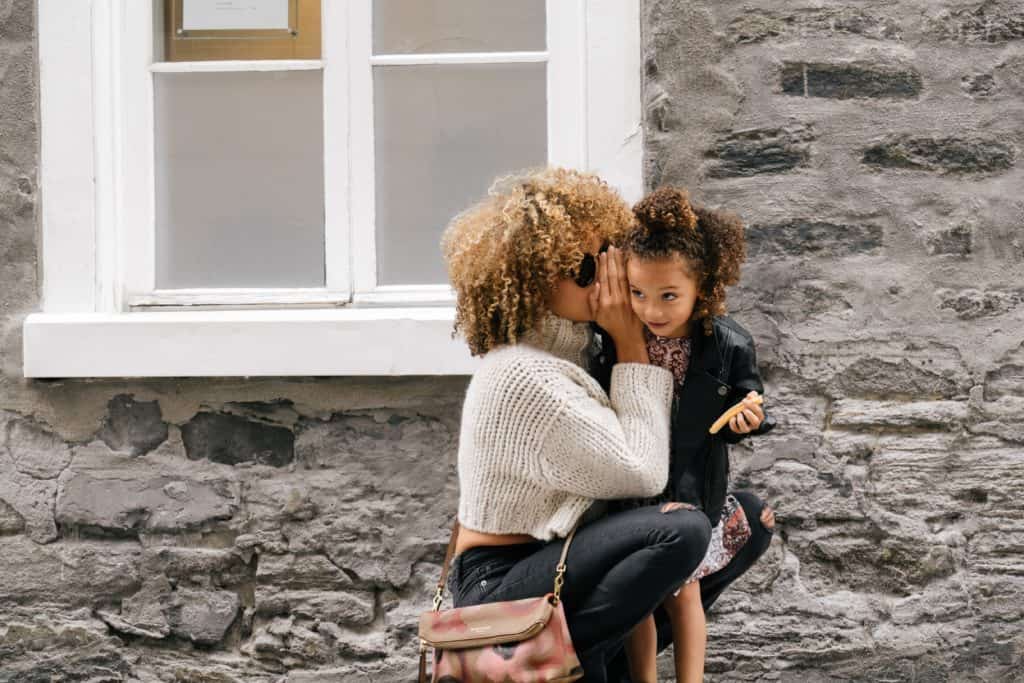 Pin
PinThere are many resources available to help you learn more about mindfulness and how to incorporate it into your parenting style. Here are some of the best mindful parenting blogs and websites:
- Mindful Mama Mentor: This blog offers tips and advice for incorporating mindfulness into your parenting style. Hunter is one of the authors of my favorite mindful parenting book, “Raising Good Humans” and she’s also got a podcast and a YouTube channel listed in this article, farther down.
- Mindful Little Minds: This website provides resources and articles on mindful parenting.
- Mindful Parenting.com.au: This blog offers guidance on how to parent with mindfulness. Highly recommend checking it out even if you don’t live in Australia. (I don’t)
- Jatluri.com: This website provides information on mindful parenting practices. “Josephine Atluri is an expert in meditation and mindfulness, helping thousands of people overcome adversity to find joy.“
- Zen Parenting Radio: This blog offers tips for simplifying your life and raising happy, healthy kids.
- Mindful Motherhood Blog: “Losing patience? Bedtime battles? Power struggles? Major meltdowns? With the right tools and mindset, parenting can feel empowering and joyful, even in the challenging moments. My goal is to offer modern, research-based tools that help you successfully navigate the complexities of parenthood.“
- Refined Prose: Katie is a work-at-home mom and writes about mindful parenting, journaling, personal growth, and conscious living. Lots of good stuff here, check out her blog!
- Us! Chill Mamas is a blog for parents who are learning about how to calm down, parent mindfully, and advocate for the Earth through sustainability. (I think this is an extension of mindful parenting since through sustainability you are looking out for future generations.)
Mindful parenting YouTube channels
- Up We Grow – Soraya at Up We Grow talks about motherhood from a feminist perspective and includes a lot of mindful parenting tips and ideas in her videos.
- The Parenting Junkie – Avital has a large YouTube channel based on topics like peaceful parenting, independent play for toddlers, minimalism, and parenting guilt.
- Hunter Clarke-Fields, Mindful Mama Mentor – Hunter is a mindful parenting coach who offers a variety of mindful parenting resources on her YouTube channel.
Facebook groups for mindful parenting
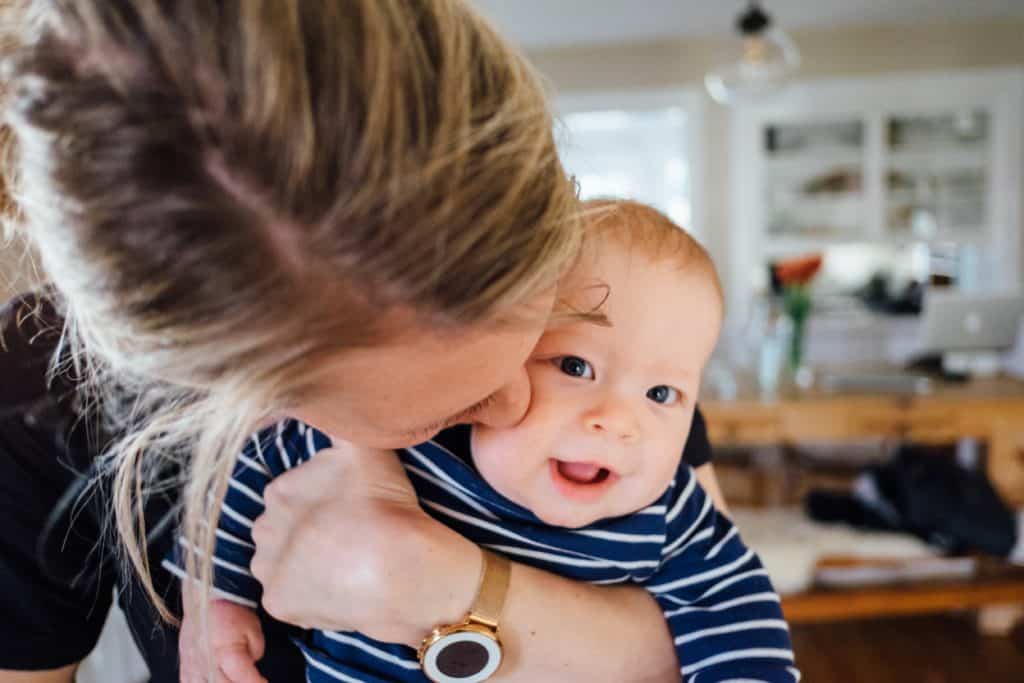 Pin
Pin- Mindful Parenting Club – A public group. “Hi everyone, share your views, activities, and ideas for the development of a child. All the teachers, parents, and other artists who have a keen interest in sharing their work are also invited.“
- Mindful Parenting Advice Group – A private group. “Welcome! The Mindful Parenting Squad is a safe place for like-minded moms and dads to come together for support and encouragement. This community is a place where parents can grow and connect with other parents, a place where we can learn how to support our children to become happy, empathetic, resilient kids.“
- Mindful Parenting for Babies and Toddlers – A private group. “This group is for any parent looking to learn more and connect with others that practice mindful parenting with babies and toddlers. Group discussion is focused on 0-3 parenting tips.”
- Mindful Mama Mentor Group – A private group. “This group is to support us in parenting more mindfully. The areas open for discussion are parenting, mindfulness, self-care, and subjects immediately adjacent. We accept comments from the heart that do not contain any promotions.“
- Mindful Parenting Support Group – A private group. “Mindful parenting is not another parenting technique on how should you teach your children, but a form of practice which to be fully present with non-judging attitude. We advocate mindfulness in parenting by being aware of our own inner experiences, using beginner mind to see our children and practicing compassion toward ourselves as well as our children when we are in difficult situations.“
- Mindful Parenting by Headspace – A private group. “This group is for parents, guardians, and caregivers who want to learn how to care for yourself and your children in a more mindful way, while exploring the peaks and pitfalls of your meditation practice with others. Our goal is to create a space for you to begin discussions, ask questions, provide answers, share stories, and support one another around your Headspace and parenting journey.“
- Embracing Mindful Motherhood and Positive Parenting – A private group. “A group for parents, run by two therapists, who want to learn how to how to show up for their children in a way that puts the relationship first. We will be smashing perfection culture in motherhood and learning about emotional regulation, social skills, coping skills, and mindset in motherhood.“
- Mindful & Conscious Parenting for Neurodivergent Kids – A private group. “THIS GROUP DOES NOT BELIEVE THAT AUTISM, ADHD, ETC ARE DISEASES OR “BAD”… THIS IS NOT A CURIST GROUP OR ABOUT MANIFESTING IT AWAY. WE ACCEPT & CELEBRATE NEURODIVERGENT MINDS.“
Podcasts for mindful parenting
- Mindful Mama – Parenting with Mindfulness: “Mindful Mama Mentor Hunter Clarke-Fields shares inspiration, interviews, and more. Mindful Mama is about becoming a less irritable, more joyful parent. We know that you cannot give what you do not have. And when you are thriving, when you have calm and peace within – then you can give it to your children.”
- Mindful Parenting by Amanda L Houle: “Get ready for transformation and to start living an empowered happier lifestyle in both your relationship and with your children. This podcast is for couples and parents who want more and who are ready to take ownership for a better quality of life.”
- The Mindful Parent
- Authentic Parenting
- Mindful Parenting in a Messy World with Michelle Gale
Addressing your own trauma to avoid traumatizing your children
 Pin
PinTrauma is a difficult thing to deal with. It can be hard to process and understand what happened, let alone move on from it. Unfortunately, if you don’t deal with your trauma, it can have a negative impact on your children.
Studies have shown that children of parents who haven’t addressed their own trauma are more likely to experience trauma themselves. This is because unresolved trauma can lead to toxic stress, which can manifest in physical and mental health problems.
It can also cause relationship difficulties, which can make it difficult to provide a stable home for your children. Ultimately, dealing with your own trauma is essential for the well-being of your children. It may be difficult, but it’s worth it for the sake of your family.
- Here’s a great podcast episode by Lindsey Lockett, a holistic trauma healing coach, on how to approach addressing your childhood trauma from an empowered perspective if you’d like to dig deeper on this topic.
- And here’s a quick general overview of how to begin healing childhood trauma, since this is such an important piece of mindful parenting.
The bottom line on mindful parenting
Mindful parenting is a great way to improve your relationship with your child and to become more aware of their needs. It can be difficult to get started, but with practice, it will become easier. If you’re new to mindful parenting, start by practicing mindfulness and mindful listening.
Related posts for further reading
- How to Discipline Your Child Without Hitting or Yelling (Positive Parenting Tips)
- Parenting with anxiety: 7 ways to make it work better
- 13 Realistic Ideas for Better Self Care for Work from Home Parents
- 24 Powerful Mindful and Positive Affirmations for Toddlers
- Why All Parents Should Make Time for Hobbies
- 5 Ways to Stay More Present in Your Kid’s Life
- How to Encourage Your Toddler to Love the Outdoors
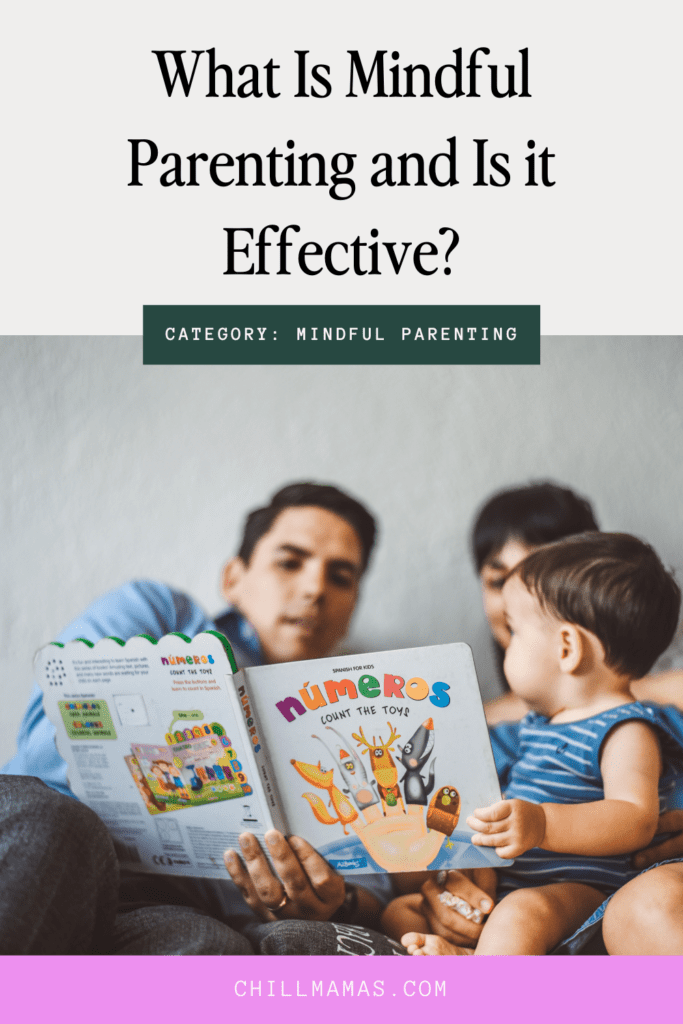 Pin
Pin
